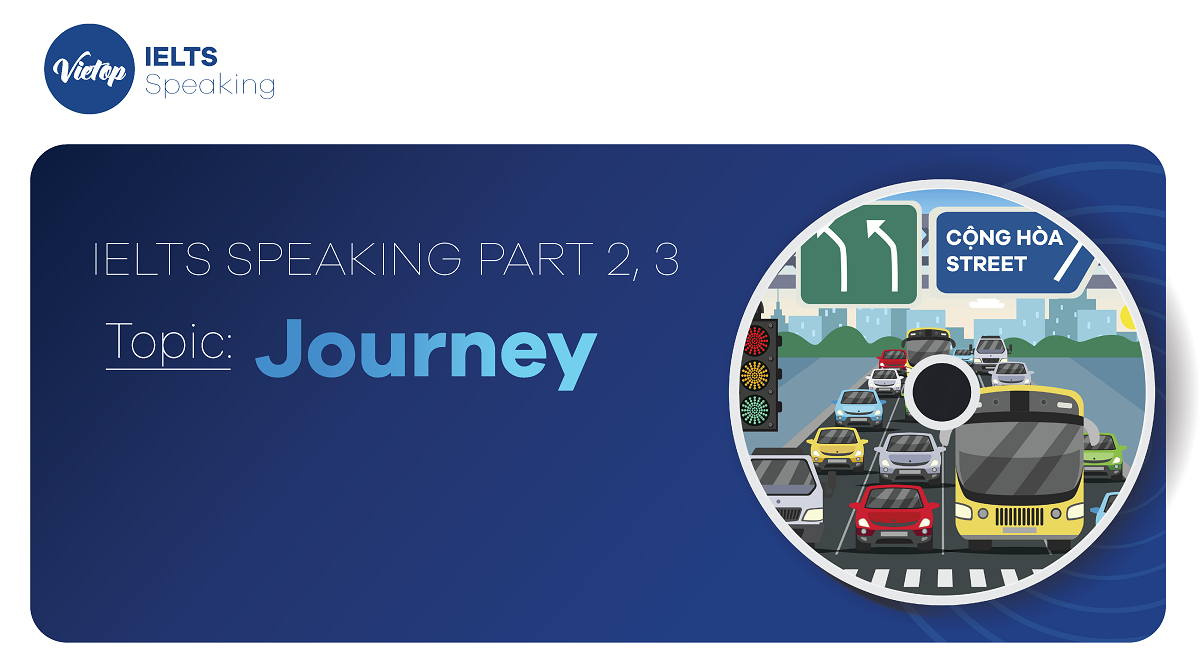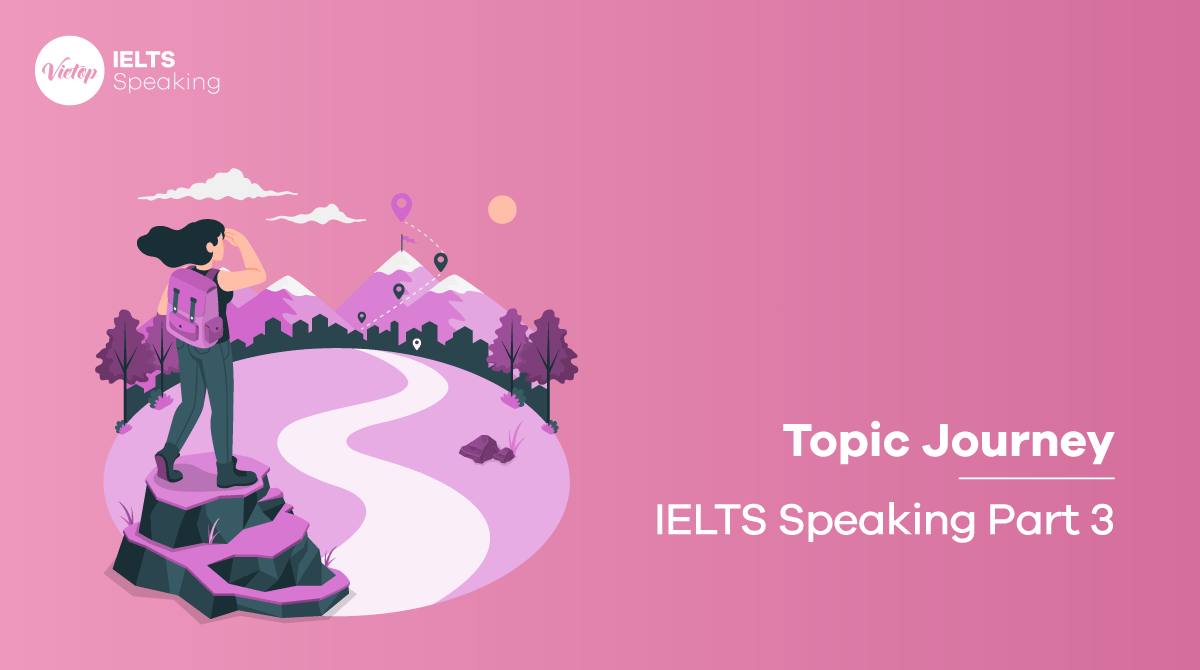Hôm nay IELTS Vietop gửi đến các bạn topic Journey – IELTS Speaking part 2, IELTS Speaking part 3. Xem ngay để cùng ôn luyện IELTS Speaking thôi nào các “sĩ tử” ơi!
1. Bài mẫu topic Journey – IELTS Speaking part 2

1.1. Đề bài
Describe a short journey that you often take but dislike
You should say:
- What it is.
- How you can get this job.
- What kinds of work you would do for the job.
- And explain why you want to have it.
- And explain why you dislike it.
1.2. Sample
I’m going to talk about my daily journey back home from work. I work for a company whose office is situated on the Cong Hoa street in this city. If you’ve been to Cong Hoa street, you’d know it has serious traffic jams during the morning and evening rush hours. To avoid that, in the morning, I usually just get to work really early to avoid being stuck in traffic. So the commute between home and work is actually enjoyable. It isn’t too hot and there aren’t many vehicles in the street.
But, the returning journey can often be nightmarish. First of all, the asphalt street has absorbed the heat of the Sun all day and usually starts to release the heat back at that time. That makes everyone sweaty and makes breathing an ordeal. On top of that, hundreds of people, each on a motorcycle, are cramped on the surface of a relatively small street.
Everyone vies for an opening because all want to get home a little bit quicker. Consequently, this makes the whole situation worse. Everyone moves with an excruciatingly slow pace, inches by inches . To make matters even worse, all the people beep their horns constantly. It makes me and pretty much everyone else irritated and grumpy.
It often takes me an hour to get back home. It’s a far cry from what could have been a 15 minute journey. Obviously, I don’t enjoy it at all and I hope that some sort of improvement such as putting a subway station there so I can take the train to and from work instead of riding a bike.
1.3. Vocab
- Commute (n): hành trình (đi-về)
- Nightmarish (adj): như ác mộng
- Asphalt (adj): nhựa đường
- Sweaty (adj): đầy mồ hôi
- Ordeal (n): cực hình
- To vie for : đua nhau
- Consequently (adv): trạng từ cho hệ quả
- To beep the horn: bấm còi/kèn xe
- Grumpy: quạu

Nhận tư vấn miễn phí khóa học hè
2. Bài mẫu topic Journey – IELTS Speaking part 3

2.1. What kind of transportation do people in your country often use for travelling?
Two-wheeled vehicles, specifically motorcycles, are the most popular. Most Vietnamese people learn how to ride them before turning 20. They are popular since our road systems aren’t specially designed for cars and trucks. They offer great maneuverability on our narrow streets. Recently, there’s been an increase of cars in traffic so let’s hope that our road system can catch up.
- Maneuverability (n): tính linh hoạt, cơ động
2.2. Do you think that decreasing the use of transportation is a good measure to protect the environment?
This is a complicated issue as we cannot just simply say we’ll reduce the number of vehicles used then the environmental problems would solve themselves. I think we have no choice but to use transportation. They’re a part of our civilisation, we use them to mobilise ourselves to produce food, to ship the food to whoever needs it, to transport materials to build schools and hospitals, to bring patients from home to the ICU.
Decreasing every kind of transportation is out of the question. However, we can start to aim for more realistic and practical goals such as decreasing the number of personal vehicles by developing efficient systems of public transportation. This should ease the said problems a bit. Furthermore, the impact of transportation on the environment isn’t the only problem. Industrial waste, littering, and deforestation must also take the blame.
- To mobilise (v): đi lại, di chuyển
- The ICU(intensive care unit): đơn vị điều trị tích cực
- To be out of the question: khó xảy ra, chuyện viễn tưởng
- Efficient (adj): hiệu quả
- To ease: làm giảm
- Take the blame: chịu trách nhiệm
2.3. What are the differences between traveling to a city and reading about it in the book?
There are plenty of differences between the two situations, neither of which is better than the other. First-hand experience gives you the full picture of the place, the good and the bad. You can also get to meet new people.
So a lot of people, that is more enjoyable. On the other hand, when reading about the place, its image is embellished by your imagination. Essentially, you have created a version of it in your mind which you have full control over. It can be anything you wish. It’s more suitable for the dreamers.
- First-hand experience (adj + noun): kinh nghiệm thực tế
- To embellish (v): tô điểm
Hy vọng với 2 bài mẫu trên về topic Journey từ IELTS Vietop sẽ giúp ích được bạn trong quá trình luyện thi IELTS tại nhà. Nếu như có thắc mắc gì về bài viết thì hãy để lại bình luận bên dưới để được giải đáp nhé.
Chúc bạn đạt kết quả tốt! Và đang cần một khóa học chất lượng, nhanh chóng thì hãy tham khảo ngay khóa học IELTS 1 kèm 1 tại Vietop nhé!











